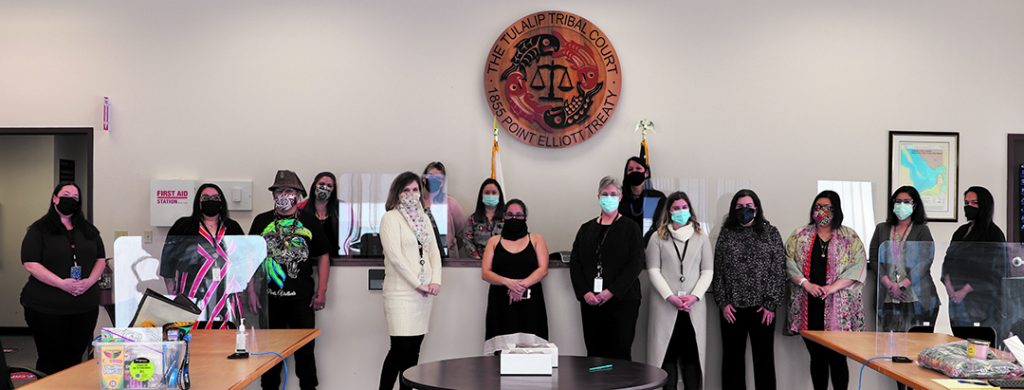
By Kalvin Valdillez, Tulalip News
Nearly five months ago, The Tulalip Tribal Justice Department introduced a new program for Tulalip parents who are struggling with an addiction. It’s a structured plan for the parent who is ready to kick their habit and regain custody of their children for good.
Tulalip Family Wellness Court is, in many ways, modeled after the success of the Healing to Wellness Court, only the new program is voluntary-based, without the criminal, mandated-court element. And in addition to helping tribal members get clean and maintain a healthy and sober lifestyle, the Family Wellness Court focuses primarily on one goal, reunifying parents with their children in an effective, timely and responsible manner.
“We’re one of the first in the nation to be doing this as a tribe because we want our people to be healthy, happy and successful,” said Melissa Johnson, Family Wellness Court Coordinator. “We want people to understand it’s different than the standard dependency proceedings that parents involved with beda?chelh go through. With more frequent review hearings in the drug court model, they get a chance to show their progress in real-time.
“They tend to get their kids back faster in this type of program because of the intensive case management and the added support. We are still new and maybe people don’t know about us yet, but the program is 100% voluntary. They have to have an open dependency with beda?chelh. And if they want to work on getting their kids back, they can benefit from our team approach.”
That team approach is a big aspect of the Family Wellness Court. The team consists of multiple professionals including Tribal courthouse officials, attorneys, beda?chelh representatives, counselors and recovery specialists. The idea is that with everybody meeting regularly and on the same page, the client will stay in-compliance and will make positive progress in maintaining their sobriety if they know exactly what their team expects from them.
Kelly Prayerwarrior, Family Recovery Support Specialist, explained her role as one of those team members in the Family Wellness Court system, “I’m a parent advocate, I help the parent if they need help finding resources for school or housing, maybe visitation with their kids, or whatever they need to help move them forward so they can get their kids back. I think the Family Wellness Court is really exciting. I like the wrap-around services that we offer. We definitely have a system that’s built for success. If the people come in and really work the system, they will see success.”
As a member of the team themselves, the clients will receive a personalized game-plan to reunification and their success depends on what they put into the program. If they give it their all and follow the plan to a T, clients will more than likely have their kids back much sooner than they would with the standard custody process.
“It’s an alternative to the current dependency proceedings,” said Melissa. “I think there is an advantage to the team approach, recognizing the successes, strengths and any issues that may arise in real time, other than waiting. Because with the current dependency proceedings, months can go by between hearings. I think with Family Wellness Court, the courtroom becomes a therapeutic environment. You see that relationship with the judge and the team, it’s not adversarial at all. It’s so much different from when you go to court and everything seems scary. The judge comes off the podium and sits with us.”
Judge Michelle Demmert presides over each case and builds a strong connection with the clients. She previously mentioned that the Family Wellness Court model is important to the tribal community and that the program is special to her personally. As a recovering addict, Judge Demmert has seen both sides of the coin, and she often goes out of her way to let the client know she understands how hard recovery can be, making her support and encouragement that much more authentic to the parent throughout the hearings.
“To me, personally, I’m 33 years in recovery,” expressed Judge Demmert. “I think it’s really important for people to know that about me so that they don’t think I’m judging them like I’ve never been in their situation, when most likely I have. I want them to know that there’s hope, that I believe in them and that I love them.”
So far, the Family Wellness Court has helped multiple parents begin the reunification process. In the very first court hearing, Judge Demmert explained that the clients should expect setbacks and that it’s important to learn from any relapses that may occur.
Melissa explained that up to this point, though there are many clients who are ‘super-compliant’, there are those parents who aren’t in-compliance but she believes that in time, the program will prove to work for them as well.
She stated, “Even the people who aren’t 100% in-compliance, I see them still showing up every week, and that is progress. Just showing up is progress and realizing that we’re still here for them no matter what. We’re all working together, working toward the goal of reunification and for the kids to stay home, to stay out of the system and to stop that cycle. We can help strengthen families and get families reunited faster. All the parents want their kids back, but sometimes it seems so far out of reach. We try to help people with that and bring that support.”
The Family Wellness Court is currently taking on new clients. If you, or anybody you know is ready for a new approach to sobriety and reunification, and are ready and willing to take on the intensive, but evidence-based, model in order to regain custody, please contact Melissa at (360) 716-4764.